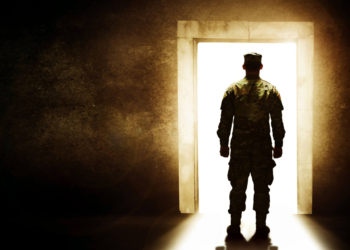When Lt. j.g. Marcia Villavicencio was eyeing the end of her initial Navy enlistment, she was eager to transition from sailor to student. Free-spirited and expressive, she longed for college and its freedoms.
“I joined right out of high school,” she said. “Active duty can be all-consuming.”
But as campus life approached, Villavicencio realized she wasn’t ready to cut ties to the military altogether – especially the benefits and security it offered. So, she joined the Navy Reserve.
“I didn’t want to be just a civilian,” said Villavicencio, who has since commissioned and now serves as a Navy Reserve officer recruiter. “I wanted to have a safety net, in a way.”
Plenty of pros
Reserve component service – whether through the Army or Air National Guard or one of the reserve forces – offers plenty of benefits, especially to service members anxious about transitioning to civilian life.
“For me, it was kind of a ‘just in case’ kind of thing,” Villavicencio said.
While it’s not usually enough to live off, reserve component service offers a steady paycheck in return for training conducted (at minimum) one weekend each month and a couple weeks each year, usually in the summer. For a college student, that’s good money, and for non-students, it can supplement a full-time gig while one gets established in the civilian workforce.
“Getting that extra paycheck can be really helpful,” said Sgt. 1st Class Pedro Cordoba, a recruiter with the Washington Army National Guard. “And your job is federally protected. … (Unlike civilian jobs) they can’t just fire or demote you.”
RELATED: How to navigate the post-military job hunt for a successful transition
Just as significant, Cordoba added, was the offer of quality health care on the cheap. A single guardsman and reservist can secure TRICARE Reserve Select for around $50 each month, and those with families also enjoy reasonable rates. One need not be near a military base, either, so long as they use in-network providers. Cost-effective dental plans are available, too.
Put in enough years, and one can retire from the Guard or reserves. After 20 or more years, one can call it quits and expect to pick up a retirement check when they hit around age 60. And the more active-duty time, the bigger the check.
“It’s like a part-time job you can retire from,” Villavicencio said.
Other reserve component benefits include:
- Bonuses for enlistments and high-demand career fields.
- Choice in where to live and work.
- Flexible training demands.
- Access to active-duty amenities, such as base commissary or gyms.
- Opportunities to go on short-term, full-time military orders.
- Civilian networking opportunities.
- Continued military training, advancement and travel.
- Educational assistance (especially in the National Guard).
A couple of (pretty big) cons to reserve component
As flexible as the reserve component service is, it can also be highly disruptive.
While most coming off active duty get short-term deferments, meaning they won’t likely get deployed for the first year or so of civilian life, mobilizations are a real possibility for guardsmen and reservists. In fact, during the height of the wars in Iraq and Afghanistan, reserve component service members made up about half of those deployed to combat zones.
“If something goes down or something happens, you could get called up,” said Villavicencio. “You are still in the military, after all.”
And if you’re a guardsman, you also face the risk of getting mobilized for state emergencies. Wildfires in California and border missions in Texas, for example, can demand several months each year from a National Guardsman.
However, guardsmen, Cordoba notes, are less likely to get called up as an individual, as the National Guard tends to mobilize at the unit level.
“The reserve has the ability of plucking an individual out based on their MOS,” he said. “If an active-duty unit in California is going to deploy to Africa, they can reach all the way back to West Virginia and grab a reservist and plug them into their unit. The National Guard doesn’t typically do that.”
For guardsmen and reservists, however, even deployments can be benefits, offering a sense of mission and fulfillment, strengthening their ties to their unique military tribes.
“It’s a community within community,” said Cordoba.
Read comments
























